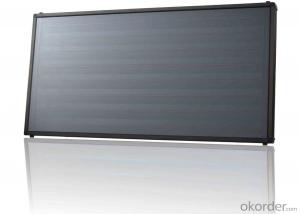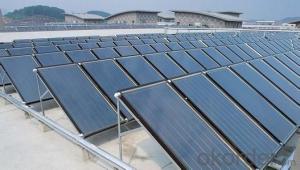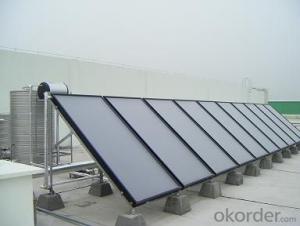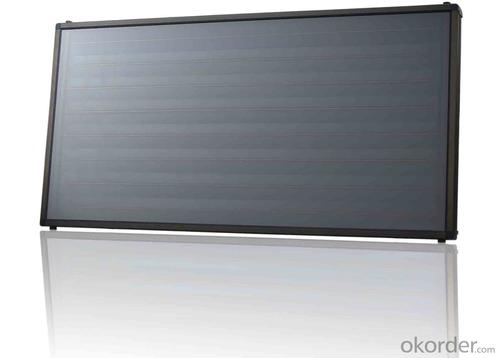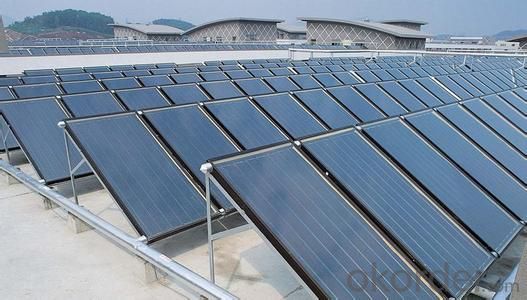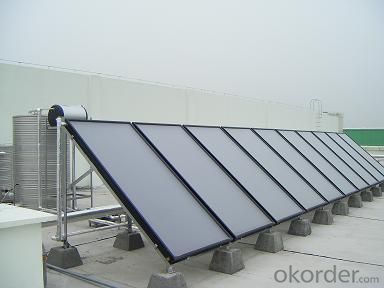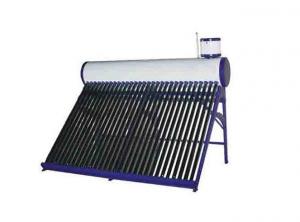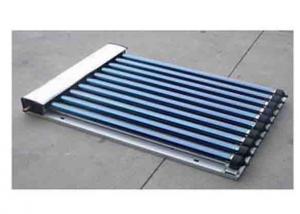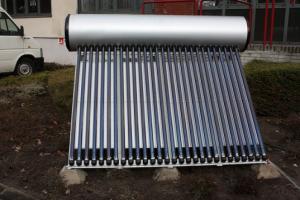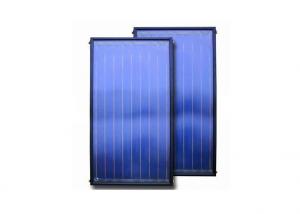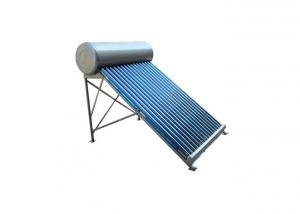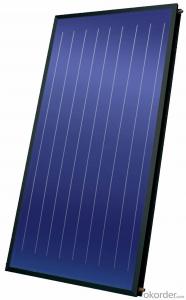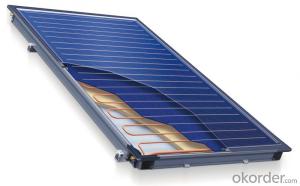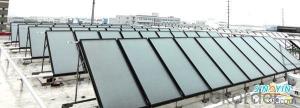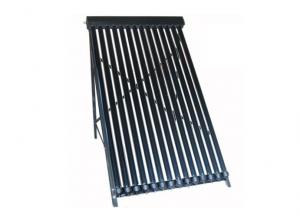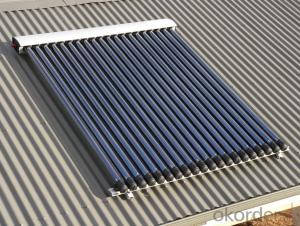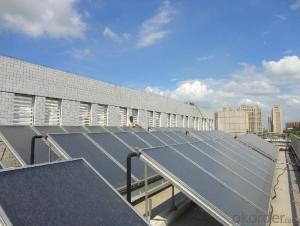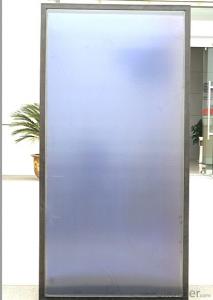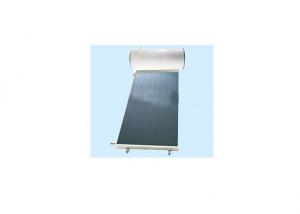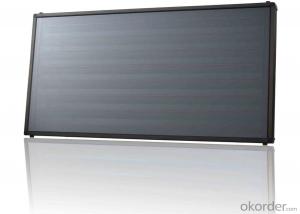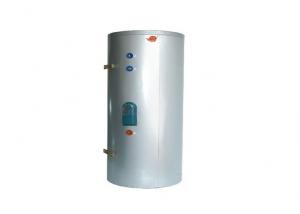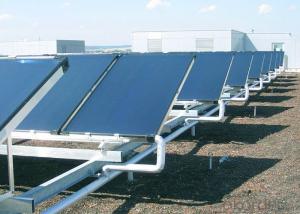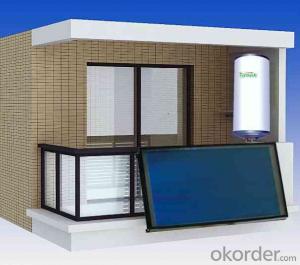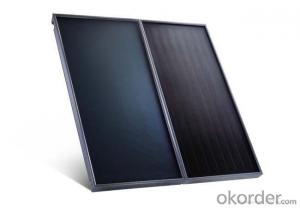Sunda Solar Collectors
- Loading Port:
- China Main Port
- Payment Terms:
- TT OR LC
- Min Order Qty:
- -
- Supply Capability:
- -
OKorder Service Pledge
OKorder Financial Service
You Might Also Like
solar flat plate collector
Type black-B
Dimension(LxWxH) (mm) 2000×1000×80
Gross area (m²) 2
Efficiency area (m²) 1.85
Gross weight of collector (kg) 29±3
Thermal efficiency(ηa0) 0.75
Stagnation temperature 180°C
Max.working pressure 1.2Mpa
Recommended circulation flow Water or propylene glycol
Resistance to freezing Less than or equal to 0°C
Transparent cover
Number of cover (pc) 1
Dimension LxW (mm) 1980x980
Cover material Low-iron tempered glass cover
Cover thickness (mm) 3.2
Absorber
Dimension LxW (mm) 1945*945
Material Cu & Al
Surface treatment Black chrome Coating
Absorptivity: 0.94±0.02
Emissivity: 0.09±0.02
Construction type aluminum sheet and Tube, Laser welding
Header material Copper Tp2
Header tube size (mm) Ø22x0.6x1060 2pcs
Riser material Copper Tp2
Riser tube size (mm) Ø8x0.45x1883 8pcs
Fill capacity 1.6L Including Header Pipes
Thermal insulation
Insulation material 16K Fiber glass insulation (back)
Insulation thickness 30mm (back) 25mm (side)
Conductivity(W/mK) Less than or equal to 0.042 under 75°C
Casing
Frame Aluminum Alloy
Frame Color Silver
Back Plate 0.5mm Aluminum back plate
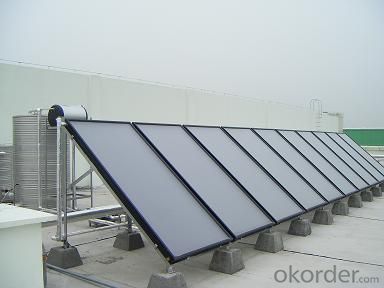
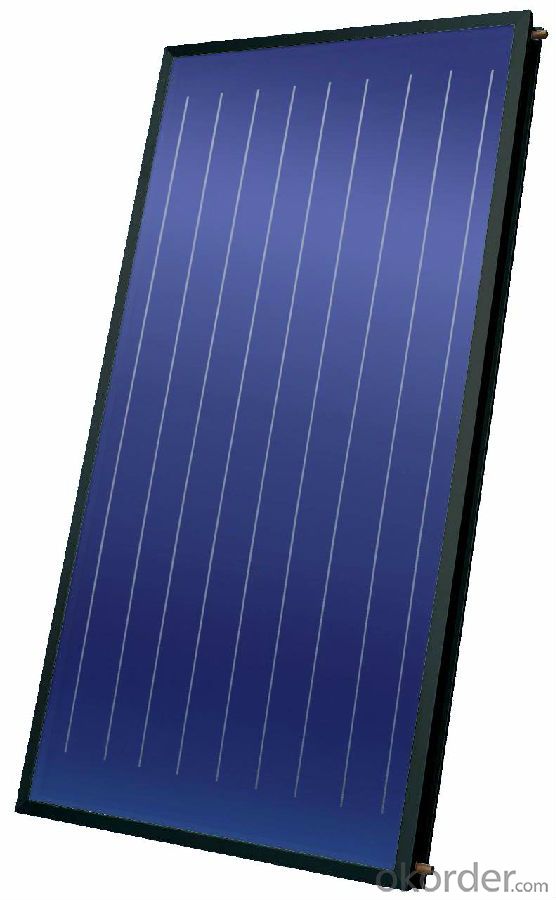
- Q: How do solar collectors impact local economies?
- Solar collectors have a significant impact on local economies in several ways. Firstly, the installation and maintenance of solar collectors create job opportunities within the community. These jobs range from sales and marketing to installation and maintenance technicians. As the solar industry continues to grow, so does the demand for skilled workers, resulting in a boost in employment rates and income levels. Moreover, solar collectors help reduce energy costs for both residential and commercial properties. By harnessing the sun's energy, individuals and businesses can generate their own electricity, leading to substantial savings on utility bills. This increased disposable income can then be reinvested into the local economy, stimulating growth and supporting other businesses within the community. In addition, the use of solar collectors reduces dependence on fossil fuels, which in turn decreases the demand for imported energy sources. This shift towards renewable energy contributes to energy independence, reducing the vulnerability to price fluctuations and supply disruptions. Consequently, local economies become more resilient and stable, as the money that would have been spent on imported energy can now be circulated within the community. Furthermore, the installation of solar collectors can increase property values. Studies have shown that homes equipped with solar panels tend to sell at a premium compared to those without. This value appreciation positively impacts homeowners, as they can potentially sell their properties at higher prices, leading to increased wealth and economic stability within the community. Lastly, solar collectors promote the development of local industries and businesses. With the increased demand for solar technology, local manufacturers, suppliers, and retailers have the opportunity to expand and thrive. This growth creates a ripple effect, generating additional employment opportunities and fostering innovation within the region. In conclusion, solar collectors have a positive impact on local economies by creating jobs, reducing energy costs, promoting energy independence, increasing property values, and fostering the growth of local industries. As communities transition towards renewable energy sources, they not only benefit from a cleaner and more sustainable environment but also experience economic growth and prosperity.
- Q: Can solar collectors be used in hydrogen production?
- Yes, solar collectors can be used in hydrogen production. Solar energy can be harnessed to power electrolysis, a process that splits water molecules into hydrogen and oxygen, thus producing hydrogen gas. This method, called solar water splitting, utilizes the sun's energy to generate clean and renewable hydrogen fuel.
- Q: How efficient are solar collectors?
- Solar collectors are highly efficient at converting sunlight into usable energy. The efficiency of solar collectors typically ranges from 15% to 20%, although some advanced systems can achieve efficiencies above 30%. These collectors are designed to capture as much sunlight as possible and convert it into electricity or heat, making them a sustainable and cost-effective option for renewable energy generation.
- Q: How long does it take for solar collectors to pay for themselves?
- The payback period for solar collectors can vary depending on factors such as the initial cost, energy usage, and local incentives. On average, it typically takes around 5 to 15 years for solar collectors to pay for themselves through energy savings and potential government incentives.
- Q: Can solar collectors be used in geothermal power plants?
- No, solar collectors cannot be used directly in geothermal power plants. Solar collectors are designed to capture and convert sunlight into thermal energy, while geothermal power plants harness the natural heat from within the Earth. The two technologies have different principles and operate in unrelated ways. Geothermal power plants rely on drilling deep into the Earth's crust to access hot water or steam, which is then used to drive turbines and generate electricity. Solar collectors, on the other hand, require direct sunlight to heat a fluid or air, which is then used for various heating applications or converted into electricity using solar panels. While both solar and geothermal energy are renewable sources, they are distinct and cannot be directly combined in power generation.
- Q: What is a solar collector?
- A solar collector is a device that captures and absorbs sunlight to generate heat or electricity. It is designed to collect and convert solar radiation into a usable form of energy, typically through the use of photovoltaic cells or a heat transfer fluid.
- Q: Can solar collectors be used for drying construction equipment?
- Yes, solar collectors can be used for drying construction equipment. The heat generated by the solar collectors can be utilized to dry out the equipment, helping to remove moisture and prevent rust or damage.
- Q: Can solar collectors be used for greenhouse heating?
- Yes, solar collectors can be used for greenhouse heating. Solar collectors, such as solar thermal panels, can absorb sunlight and convert it into heat energy, which can then be used to warm up the greenhouse. This sustainable heating method can help maintain optimal temperatures for plant growth and reduce reliance on traditional heating systems.
- Q: Can solar collectors be used for heating car manufacturing plants and assembly lines?
- Yes, solar collectors can be used for heating car manufacturing plants and assembly lines. Solar thermal systems can provide a sustainable and cost-effective solution for industrial heating needs, including space heating and process heating in large facilities. By harnessing the sun's energy, solar collectors can generate heat which can then be used for various heating applications in car manufacturing plants and assembly lines.
- Q: Can solar collectors be installed on a flat roof?
- Yes, solar collectors can be installed on a flat roof. In fact, flat roofs are often ideal for solar panel installations because they provide ample space and easy access for mounting the collectors.
Send your message to us
Sunda Solar Collectors
- Loading Port:
- China Main Port
- Payment Terms:
- TT OR LC
- Min Order Qty:
- -
- Supply Capability:
- -
OKorder Service Pledge
OKorder Financial Service
Similar products
Hot products
Hot Searches
